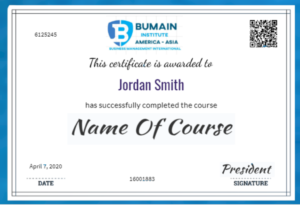
In a world where more and more activities are centered online, developing an effective digital marketing plan is a must for every organization. Learn how to assess customer needs and utilize social media, search engine marketing, display advertising, content marketing, email, and more to develop high-performing integrated marketing plans that deliver on key metrics
This Course has been designed to meet the evolving needs of a digital business and help you learn how to use strategies that support better decision making.
Learners will be taught using a combination of learning methods. These include bite-sized lecture videos , cohort-based live synchronous sessions with industry experts and live sessions , a capstone project on digital marketing, and self-learning through reading material.
Upon successful completion of program, learners will receive a certificate of completion

Curriculum
- 7 Sections
- 79 Lessons
- 10 Weeks
- Section 1 Introduction to Digital MarketingLearners will be taught using a combination of learning methods. These include bite-sized lecture videos , cohort-based live synchronous sessions with industry experts and live sessions , a capstone project on digital marketing, and self-learning through reading material.13
- Section 2 Achieving Customer-Centric Success Through Digital MarketingAchieving Customer-Centric Success Through Digital Marketing12
- 2.1Lesson 13 Product Centricity versus Customer Centricity
- 2.2Lesson 14 Customer Acquisition Costs
- 2.3Lesson 15 Customer Lifetime Value: Achieving Profitable Growth Through CLTV
- 2.4Lesson 16 Customer Segmentation
- 2.5Lesson 17 Customer Centricity: Implementation, Opportunity and Future Outlook
- 2.6Lesson 18 Acquisition and Retention Optimization
- 2.7Lesson 19
- 2.8Lesson 20
- 2.9Lesson 21
- 2.10Lesson 22
- 2.11Lesson 23
- 2.12Quiz 230 Minutes14 Questions
- Section 3 Fundamentals of Digital Marketing and E-CommerceFundamentals of Digital Marketing and E-Commerce12
- 3.1Lesson 24 Designing a Omnichannel Digital Marketing Strategy
- 3.2Lesson 25 Digital Business Models
- 3.3Lesson 26 Digital Marketing Channels and Optimization
- 3.4Lesson 27 Digital Marketing Effectiveness
- 3.5Lesson 28 Digital Marketing Tools and Techniques Workshop
- 3.6Lesson 29
- 3.7Lesson 30
- 3.8Lesson 31
- 3.9Lesson 32
- 3.10Lesson 33
- 3.11Lesson 34
- 3.12Quiz 340 Minutes11 Questions
- Section 4 Marketing Analytics and ExperimentationMarketing Analytics and Experimentation14
- 4.1Lesson 35 Sources of Marketing Data
- 4.2Lesson 36 A/B Testing and Marketing Experimentation
- 4.3Lesson 37 Conversion Funnel Analytics
- 4.4Lesson 38 Web and Social Media Analytics Workshop
- 4.5Lesson 39 Attribution Modeling Workshop
- 4.6Lesson 40
- 4.7Lesson 41
- 4.8Lesson 42
- 4.9Lesson 43
- 4.10Lesson 44
- 4.11Lesson 45
- 4.12Lesson 46
- 4.13Lesson 47
- 4.14Quiz 410 Minutes15 Questions
- Section 5 Applications of Technology in Digital marketingApplications of Technology in Digital marketing. AI and Personalization tech for Digital Marketing (AI tools, personalization, customization, catbots)13
- 5.1Lesson 48 AI and Personalization tech for Digital Marketing (AI tools, personalisation, customisation, chatbots)
- 5.2Lesson 49 Industry Case Studies
- 5.3Lesson 50 Marketing Automation Tools and Techniques
- 5.4Lesson 51
- 5.5Lesson 52
- 5.6Lesson 53
- 5.7Lesson 54
- 5.8Lesson 55
- 5.9Lesson 56
- 5.10Lesson 57
- 5.11Lesson 58
- 5.12Lesson 59
- 5.13Quiz 520 Minutes12 Questions
- Section 6 Capstone ProjectGrowth Marketing Strategies , Real World Application Project10
- Section 7 Other TopicsDesigned to help you create better digital marketing and growth strategies12
- 7.1Lesson 69 Understanding the Digital Landscape and the customer Funnel
- 7.2Lesson 70 Assessing Opportunities in paid Digital Media
- 7.3Lesson 71 Assessing Opportunities in Owned Digital Media
- 7.4Lesson 72 Implementing an integrated Digital Marketing Plan
- 7.5Lesson 73
- 7.6Lesson 74
- 7.7Lesson 75
- 7.8Lesson 76
- 7.9Lesson 77
- 7.10Lesson 78
- 7.11Lesson 79
- 7.12Quiz 710 Minutes13 Questions
Instructors
FAQs
A digital marketing strategy is a plan that outlines how your business will achieve its marketing goals via online channels like search and social media. Most strategy plans will summarize which online channels and digital marketing tactics you will use, plus how much you will invest in these channels and tactics.
Examples of digital marketing strategies include a social media campaign that includes partnerships with influencers, a content marketing strategy that uses online guides to drive leads, or a growth marketing strategy that uses social media and email build customer loyalty.
Establishing a digital marketing strategy is critical. If you partner with an experienced full-service digital marketing agency, you can trust that one of our initial to-dos is building a smart and competitive strategy for your company — which is a part of digital marketing campaign management..
Without Internet marketing strategies, your business doesn’t have a map for achieving its goals or objectives and key results. You know what you want to accomplish, but you don’t know how. That often leads to the launch of a digital marketing campaign that fails to drive any results. If you want to invest in digital marketing, you need to invest in a digital marketing plan.
Curious about how to create a digital marketing strategy? Follow these eight steps: Define your brand: Outline or use your brand guidelines to define your brand and how it’ll come through in your online campaigns. Think about your unique selling points (USPs), brand voice, and value proposition. Build your buyer personas: Determine who your business wants to reach with custom buyer personas. Think about user demographics, as well as the motivations that drive people to choose your company, products, and services. Create your S.M.A.R.T. goals: Use specific, measurable, achievable, realistic, and timely goals (also known as S.M.A.R.T. goals) to guide your strategy. Think about your organization’s short- and long-term goals for growth. Choose your digital marketing strategies: Pick the best strategies for your business. Focus on the techniques that offer the most value for your business and industry, versus trendy strategies. Set your digital marketing budget: Research digital marketing pricing to build a realistic budget for your business. For reference, most businesses spend $2500 to $12,000 per month on online marketing. Brainstorm your strategy: Guide your strategy to success by planning your strategy. If you’re advertising, determine your ad spend. If you’re publishing content, build your content calendar. Launch your campaigns: Following your planning, launch your campaigns across channels. Ensure all your channels feature the appropriate tracking information. Your website, for example, should feature your Google Analytics tracking code. Track your results: Monitor and measure the performance of your strategies by tracking their performance. Use Google tools like Google Analytics, Google Search Console, and Google Ads to keep a pulse on your strategies and their return on investment (ROI). With these eight steps, your company can launch your first online marketing strategy. If you need help creating your online marketing strategy (or want to create the best one), consider online marketing services
SEO PPC Content Marketing Email Marketing Social Media Marketing Voice SEO Video Marketing
Requirements
- The Digital Marketing Professional program is any one who wnats to develop their skills and increase their command of this dynamic and highly in-demand field
- Traditional marketing / PR professionals who want to learn digital strategies, tools and best practices.
- Digital marketing professionals who want to advance their careers with recognized certifications.
- Small business owners & entrepreneurs who want to quickly develop strategies and frameworks to drive results.
- Recent graduates who want to develop industry expertise.
- Career changers who want break into the field with comprehensive training.
- Consultants who want to develop their digital marketing knowledge to better serve their clients.
Features
- Understand how to create an advanced, data-driven digital marketing strategy.
- Deliver customer-centric and personalized experiences across channels to secure a sustainable competitive advantage.
- Utilize marketing testing techniques to determine which strategies offer higher ROI.
- Plan and implement multichannel digital strategies that increase conversion rates and growth.
- Determine how owning and managing marketing technology can produce positive outcomes and deliver a unified customer experience.
- Learn the latest advanced digital marketing skills
Target audiences
- This Course is designed for leaders , mid-level career professionals, and anyone looking to transition into digital marketing.
- People who want to expand their digital marketing knowledge and employ analytics and technology to drive business growth and success
- People looking to transform their business or their career through digital marketing
- People who want to achieve product-market fit by leveraging digital marketing
- People seeking to revamp their business strategy through digital marketing



